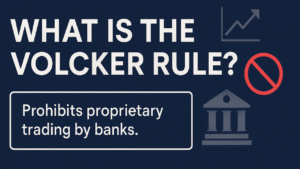 What Is the Volcker Rule? A Clear Guide for Investors and Financial Enthusiasts
What Is the Volcker Rule? A Clear Guide for Investors and Financial Enthusiasts
The Volcker Rule is one of the most significant financial regulations to emerge from the aftermath of the 2008 financial crisis. Named after former Federal Reserve Chairman Paul Volcker, this rule aims to prevent banks from engaging in risky trading practices that could threaten the stability of the financial system. Whether you’re a retail investor, financial blogger, or fintech developer, understanding the Volcker Rule is essential to grasp how modern banking interacts with the stock market.
In this post, we’ll break down the Volcker Rule in plain language—covering its purpose, mechanics, exceptions, and impact on the market.
🧠 What Is the Volcker Rule?
The Volcker Rule is a provision within the Dodd-Frank Wall Street Reform and Consumer Protection Act, passed in 2010. Its primary goal is to limit speculative trading by commercial banks, especially when those trades are made using the bank’s own capital rather than on behalf of clients.
In simple terms, the rule says:
“Banks shouldn’t gamble with their own money—especially when that money is backed by taxpayer-insured deposits.”
🔍 Why Was the Volcker Rule Created?
During the 2008 financial crisis, many banks suffered massive losses due to high-risk investments and proprietary trading. These activities—where banks trade for their own profit—were often disconnected from customer needs and posed systemic risks.
Paul Volcker argued that banks should focus on traditional lending and customer services, not speculative trading. The rule was designed to:
- Protect depositors from bank failures caused by risky bets
- Reduce systemic risk in the financial system
- Separate commercial banking from investment banking
💼 What Does the Rule Actually Prohibit?
The Volcker Rule restricts two main activities:
1. Proprietary Trading
Banks are banned from trading stocks, bonds, derivatives, or other financial instruments for their own profit. This includes short-term trades that don’t serve clients or hedge business risks.
2. Ownership in Hedge Funds and Private Equity
Banks cannot own, invest in, or sponsor hedge funds or private equity funds beyond a small threshold. These entities are considered high-risk and opaque, making them unsuitable for institutions backed by public deposits.
⚖️ Key Exceptions and Loopholes
While the rule is strict, it’s not absolute. Banks are still allowed to:
- Make trades on behalf of clients (market-making)
- Hedge risks related to their business operations
- Trade government securities, such as U.S. Treasuries
- Engage in underwriting and asset management
In 2020, regulators eased some restrictions, allowing banks more flexibility in investing in venture capital funds and simplifying compliance for smaller institutions.
📊 How Does the Volcker Rule Affect the Stock Market?
The Volcker Rule has had a mixed impact on market dynamics:
✅ Pros
- Improved financial stability by reducing speculative risk
- Clearer separation of banking functions, reducing conflicts of interest
- Greater transparency in bank trading activities
❌ Cons
- Reduced liquidity in certain markets, especially during stress
- Higher compliance costs for banks
- Limited innovation in proprietary trading strategies
For retail investors, the rule doesn’t directly affect day-to-day trading. However, it does shape the behavior of large financial institutions that influence market trends and liquidity.
🧩 Why It Matters for Fintech Developers and Educators
If you’re building financial tools or educational content, the Volcker Rule is a prime example of how regulation shapes user experience. It reinforces the importance of:
- Transparency in financial products
- Risk management in algorithmic trading and investment platforms
- User education around institutional behavior and market structure
Embedding tooltips, FAQs, and clear disclosures in your plugins or content can help users understand how regulations like the Volcker Rule affect their financial decisions.
📝 Final Thoughts
The Volcker Rule is more than just a line in a law—it’s a reflection of how society balances innovation with responsibility in the financial sector. By limiting speculative behavior, it aims to protect consumers and maintain trust in the banking system.
Whether you’re an investor, developer, or educator, understanding the Volcker Rule helps you navigate the financial landscape with greater confidence and clarity.